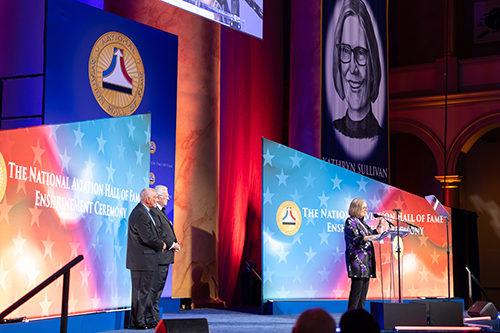Campus News
Alumna Kathryn Sullivan enshrined in the National Aviation Hall of Fame
Kathryn Sullivan (Cowell ’73, Earth sciences) was the first American woman to walk in space, the first woman to reach the deepest point of the ocean floor, and the only person to ever do both. On Sept. 22, she was enshrined in the National Aviation Hall of Fame in Washington, DC.


Kathryn Sullivan (Cowell ’73, Earth sciences) has gone places that most humans will never see in their lifetime. A trailblazer, barrier-breaker, scientist, and explorer, Sullivan was the first American woman to walk in space, the first woman to reach the deepest point of the ocean floor, and the only person to ever do both. Those accomplishments only crack the surface of her contributions to space, ocean, and Earth exploration.
In recognition, Sullivan was enshrined in the National Aviation Hall of Fame in Washington, DC, on Sept. 22.
“It is a huge honor,” Sullivan said. “When I read through the roster of previous enshrinees, every name I recognized was someone I’d heard about since I was a kid. They’re legendary names that first flew, that established the earliest airplane production companies, the airlines we know today, and the aerospace companies of today. So it’s very wonderful company to join.”
The National Aviation Hall of Fame was founded in 1964 in Ohio—the birthplace of aviation—as a museum, learning and research center, and an annual awards ceremony. It recognizes the tenacity, genius, and ingenuity of the people of air and space.
“We believe this is an excellent class, and we are already looking forward to their induction in Washington, DC,” NAHF Board of Nominations Chair Tom Lodge said in a May press release announcing the enshrinees. “From pioneers Benn and Coffey to visionaries Gittens and Stimpson and to aerospace heroes Haise and Sullivan, the NAHF’s Class of 2023 represents the best in aviation. We applaud the Board of Nominations for their challenging and thorough work.”
Sullivan served as Under Secretary of Commerce for Oceans and Atmosphere and as Administrator of the National Oceanic and Atmospheric Administration (NOAA) in the Obama administration, was the Former President and CEO of Ohio’s Center of Science and Industry, and was appointed by President George W. Bush to the National Science Board.
In addition, Sullivan flew on three shuttle missions, including the mission that deployed the Hubble Space Telescope. She says aiding the deployment of the Hubble Space Telescope was one of the most transformative moments of her career.
“I’m fortunate to have one very tangible legacy that I’m quite proud of and tickled by, and that’s the Hubble Space Telescope,” Sullivan said. I played a significant role in getting that vehicle to orbit and ensuring that NASA had the tools and equipment needed to keep it running, and it’s now been running for well past twice its expected lifetime. Then there’s the transformations that Hubble has wrought in the world of astronomy and cosmology. ‘Impressive’ is way too weak a word for how transformative it’s been. It’s wonderful to have played a role and made it happen along with thousands of other people. It’s great to be on Team Hubble.”
From UC Santa Cruz to the Beyond
Sullivan has repeatedly underscored that her undergraduate education at UCSC was the foundation for her groundbreaking career. Sullivan entered her first year at UCSC pursuing a B.A. in foreign languages, but after a couple of science courses and an encounter with Earth & Planetary Sciences Professor Gary Griggs, Sullivan’s curiosity was piqued. She asked him what an oceanographer does, and instead of dismissing her question, he heard the curiosity beneath it; “He responded to the interest, invited me up to his lab the following Saturday, and spent three-quarters of a day fielding my questions, one after the other.”
Sullivan soon switched her major to Earth and planetary science. She says the encounter transformed her education, and she hopes to offer current students pivotal opportunities through a planned gift to UCSC, which will augment a student award fund she already established and also will support the Department of Earth and Planetary Sciences.
The Kathryn D. Sullivan Research Impact Award in Earth & Marine Sciences supports teams consisting of an undergraduate and a graduate student mentor in conducting research projects. Awardees receive financial support that covers their living expenses for a summer plus funds to participate in laboratory or field research, attend conferences, or engage in other professional development activities. Award winners build scientific knowledge while shaping a broad understanding of environmental stewardship and policy issues.
“The kind of experience I had at UC Santa Cruz, the ability to actually do some real things that count in the real world and to work closely under professors and grad students, that’s transformative. There’s plenty of research that confirms the value of undergraduate research experiences in impacting careers.”
For more information about supporting the Kathryn D. Sullivan Fund for Earth and Marine Sciences, click here or contact Branwyn Wagman, Senior Director of Science Development, at bwagman@ucsc.edu.